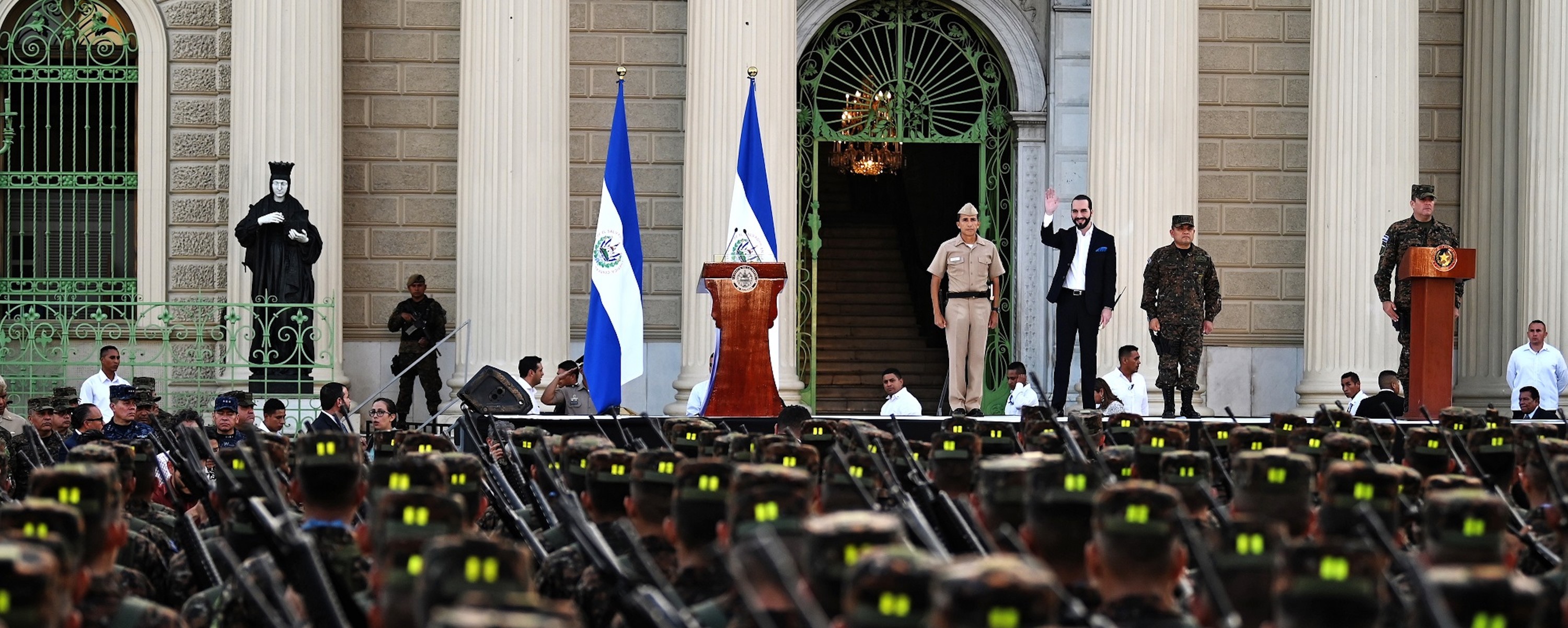The following is a transcript of episode 26 of the weekly El Faro English podcast, Central America in Minutes.
TRUMP: Home-growns are next. The home-growns. You’ve got to build about five more places.
BUKELE: Yeah. We’ve got space.
TRUMP: It’s not big enough.
GRESSIER, HOST: In the Oval Office on Monday with Nayib Bukele, Donald Trump again floated the idea of imprisoning U.S. citizens in CECOT. The two leaders also shrugged off a judicial order to bring back wrongfully-deported immigrant Kilmar Ábrego. It may have come as a surprise in the United States. But in El Salvador, presidential non-compliance —followed by judicial cooptation— has been business as usual since 2020.
This Tuesday marked exactly five years since the first time that Bukele refused to back down from flouting a Supreme Court order in El Salvador.
El Faro is… mostly… on vacation for Holy Week. But we can’t help ourselves: We’ve been keeping close tabs on Nayib Bukele’s meeting with Donald Trump at the White House. Today we share the perspectives of two Salvadoran columnists from our flagship El Faro English newsletter. You’re listening to our weekly podcast, Central America in Minutes.
In April 2020, one month into the Covid-19 pandemic, the Constitutional Chamber ordered Bukele to stop detaining people for violating his iron-fisted stay-at-home mandate. He responded accusing the magistrates of wishing death on Salvadorans. As a result of the crackdown, many died in overcrowded quarantine facilities.
As Gabriela Cáceres and Graciela Barrera noted in El Faro’s new weekly Spanish-language podcast, El resumen, the pandemic offered Bukele his first experiment in mass detentions outside the constitutional framework. For 40 out of 70 months in power, he has governed one suspension of constitutional rights or another.
Now, Bukele controls every branch and office of government in El Salvador. In his visit to the White House, at the start of Semana Santa, he excoriated Kilmar Ábrego, a Salvadoran immigrant, as a “terrorist”, dismissing a U.S. reporter’s inquiry as “preposterous”.
On Thursday night, Bukele posted pictures of Ábrego meeting with Maryland Senator Chris Van Hollen, whom he had refused to allow to enter CECOT. “Miraculously risen from the ‘death camps’ and ‘torture’, now sipping margaritas with Sen. Van Hollen in the tropical paradise of El Salvador,” tweeted Bukele. “Now that he’s been confirmed healthy, he gets the honor of staying in El Salvador’s custody.”
“This is not Nayib Bukele’s first rodeo when it comes to defying court orders. One could say he has built a successful political brand on doing just that,” writes Salvadoran journalist Ricardo Avelar in an op-ed for El Faro English. Bukele “arrived at the White House not just as a friendly counterpart, but as a smug guru in 21st-century power consolidation.”
“Dear friends in the United States: Beware the Ides of April,” says Avelar. “Beware the stabbing of your democracy that begins with the blatant defiance of judicial authority.”
U.S. news outlet Politico forecasted last weekend that Bukele's White House visit could have included talks of a plan for El Salvador to cede territory —its infamous prison CECOT— to circumvent checks on removals to El Salvador without due process. U.S. mercenary and former Blackwater CEO Erik Prince has offered to help “transport thousands of immigrants from U.S. holding facilities”.
Blackwater contractors convicted of massacring 14 Iraqi civilians in Nisour Square in 2007 were pardoned by Trump in 2020. Prince also sued The Intercept in 2021 over a report that he offered services to Russia’s Wagner Group mercenaries in Libya and Mozambique. His vision for El Salvador, per Politico, includes U.S. acquisition of Salvadoran territory.
“It is the same legal construct that allows for the use of prisons in Cuba’s Guantánamo Bay, a territory leased in perpetuity,” writes Salvadoran historian and El Faro English columnist Héctor Lindo Fuentes. “When a country as powerful as the United States obtains jurisdiction over a territory, it is very difficult for it to relinquish it.”
Over a century ago, in 1914, the bitter popular aftertaste in Central America after Nicaragua’s Chamorro-Bryan canal-rights treaty and the outbreak of the First World War were decisive in U.S. President Woodrow Wilson’s decision to discard ambitions to convert nations of the isthmus into protectorates, notes Lindo.
U.S. Secretary of State William Jennings Bryan next tried to negotiate a treaty with El Salvador to obtain a base in the Gulf of Fonseca, in order for their ships to “refuel in calm waters under U.S. jurisdiction.”
But the political reaction in El Salvador was hardly calm. President Carlos Menéndez “tried to find a way to satisfy Bryan’s wishes, but he did not dare sell Salvadoran sovereignty,” says Lindo. “The president knew that popular opposition was too powerful.”
In today’s El Salvador, perhaps it is little coincidence that Bukele has made recent controversial moves just as middle-class Salvadorans clock out for vacation.
Such was the case on December 23, when Bukele announced that he would reactivate metals mining seven years after its total ban. The move was so controversial in El Salvador, as we noted in our April 3 newsletter, that it awoke resistance from Catholic leadership, who had largely blessed his authoritarian march.
Roman Gressier wrote this episode of Central America in Minutes, with production and original soundtrack by Omnionn. Subscribe on Apple, Spotify, Amazon, iHeart, and YouTube podcast platforms.

